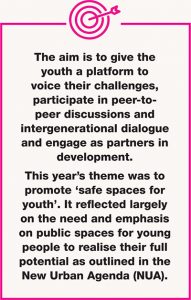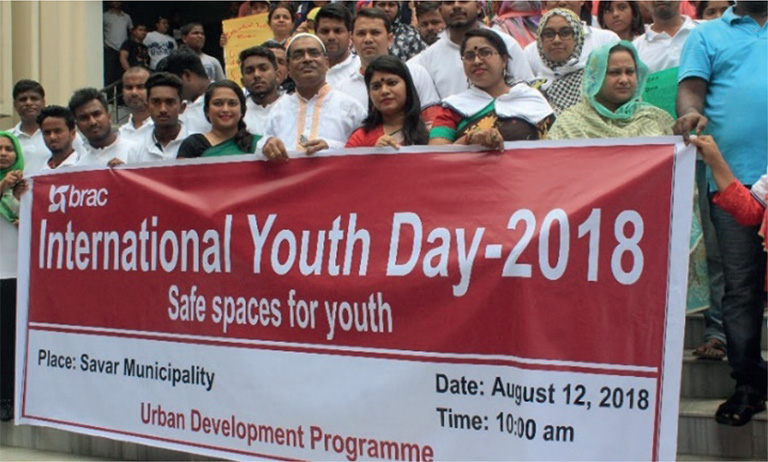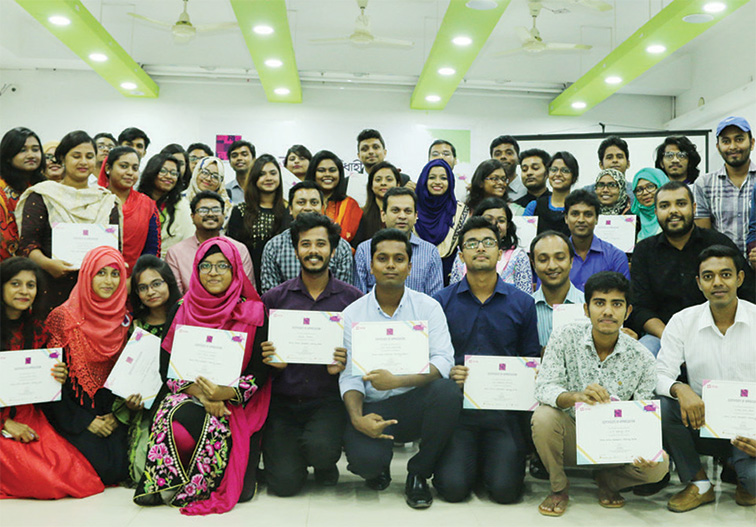Channeling the power of youth in low-income urban settlements

We believe in the power of youth
March 24, 2019
Tea stalls and hard talk
March 31, 2019Channeling the power of youth in low-income urban settlements

Taking a step away from conventional commemorations of International Youth Day, BRAC, this year, turned its focus on the youth working for the ready-made garment sector, the country’s largest industrial employer.
For a country with 48 million people aged between 10 to 24 years – the United Nations’ definition for youth – that accounts for nearly 30 per cent of the whole population, leaving behind the major segment was no longer an option.
The day has been commemorated annually around the world by civic and government organisations since 1985, to celebrate the role of young men and women as essential partners of change.

The World Programme of Action for Youth (WPAY) – the UN framework for youth development – also prioritises the provision of ‘leisure activities’ as essential to the psychological, cognitive and physical development of young people.
The increased emphasis on safe spaces comes at a time when the youth, increasingly exposed to a technologically connected world, aspire to engage deeper in political, civic, and social matters.
The availability and accessibility of such spaces become even more crucial to make this a reality and, in the long run, aligns itself with the 2030 Agenda for Sustainable Development.
The project, which has been in operation since 2017, targets major industrial centres of Tongi, Gazipur, and Savar, and focuses on the health and wellbeing of workers in the ready-made garment sector.
To mark the 2018 International Youth Day, BRAC took the initiative to organise three simultaneous day-long programmes in these areas.

The events targeted the ready-made garment youth workers and young people from the local community, and sought to increase awareness regarding safe spaces, youth rights, and entitlements.
It also aimed at expanding access to healthcare, legal support, financial services, and skills development for youth.
Awareness messages were given out through entertaining activities and in partnership with other representatives from the government, NGO, RMG factories, and media.
The efforts of these organisations also provided a common platform for these young people to share knowledge and expertise, all the while participating in development and promotion of safe livelihoods.

The young participants engaged in activities such as rallies for raising awareness, open discussions on the importance of youth development, quizzes and essay competitions, performances and songs.
At the end of the events, education grants were given out and prizes were distributed to winners of the competitions.
The events, first of its kind to be organised by BRAC Urban Development Programme, also brought about a number of key lessons that are essential for future programming and activities.
Although youth day celebrations have been in practice in Bangladesh for quite some time now, the notion is relatively obscure in the peri-urban areas of Bangladesh.
On the day, confirming attendance of key stakeholders such as government officials and factory management required constant persuasion and correspondence. It was also a challenge to confirm participation of youth at the events as the celebration fell on a workday.
Ultimately, the participation of relevant stakeholders had to be ensured through strategic persuasion and promotion of the events.
The efforts of the organisers were successful. Key stakeholders like local representatives from the Department of Youth Development were also in attendance along with local government officials, including ward councillors and the mayor.
The event itself served as a platform for strengthening inter-department dialogue between different government agencies as well as the relationship between BRAC and the youth development unit.

It also provided a platform for BRAC Urban Development Programme to highlight its impact in youth development initiatives including the ongoing education and livelihood grants support.
The importance of vocational education and training was also stressed for the development of youth, especially in the industrial areas.
Overall, the events highlighted good practices and learning models for bringing together multi-stakeholders for collective focus on one particular issue which, in this case, was youth development.
Moving forward, the lessons learned from this event can help in the development of a countrywide ‘youth action plan’, which local governments and civic organisations can adopt and implement at the grassroots level.
For that to happen, creating safe spaces is crucial so that young people can put forth their demands to elected officials in a bid to bring change.
Mahlra Khan works In the knowledge management and communications team tor BRAC Urban Development Programme.

